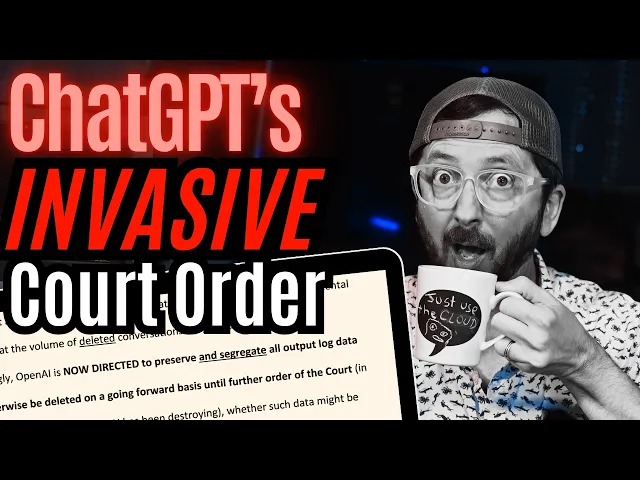ChatGPT Ai Court Order SAVES Your PRIVATE Chats! Ai News Today

Private AI chats get legal shield
When did your digital conversations become truly yours? In a landmark development for AI privacy, a federal judge has issued a protective order shielding ChatGPT conversations from government scrutiny. This represents a significant milestone in how we view AI-assisted communications, potentially establishing new precedents for digital privacy in the era of generative AI.
Key developments and implications
-
Legal protection established: A federal judge has ruled that conversations between users and ChatGPT are protected, preventing the government from accessing this data without appropriate legal process. This is particularly significant as it treats AI conversations similar to attorney-client privilege.
-
Technical architecture matters: The ruling hinged partly on OpenAI's system design, which maintains separate storage for conversations rather than aggregating all user data into a single model. This architectural choice helped establish that these were distinct private communications.
-
No automated scanning: Unlike some platforms that scan for illegal content, ChatGPT doesn't automatically monitor user inputs, strengthening the privacy argument. This distinction helped separate it from other digital communications services.
-
Scale becoming relevant: With over 100 million weekly users, ChatGPT's prevalence is forcing legal frameworks to evolve. The sheer volume of personal, sensitive information being shared with AI assistants is creating pressure for clearer privacy protections.
Why this ruling changes the game
The most profound aspect of this development isn't just the protection itself, but how it acknowledges AI assistants as extensions of our private thought processes. When you ask ChatGPT to help draft a sensitive email, brainstorm business strategies, or even work through personal problems, you're essentially extending your cognitive workspace into a digital realm. This ruling recognizes that this extension deserves similar protections to traditional private communications.
This matters enormously in our current landscape where the boundaries between technology and personal space are increasingly blurred. Companies in regulated industries like healthcare, finance, and legal services have been hesitant to fully embrace AI tools precisely because of uncertainty around data privacy. This ruling begins to establish the guardrails that could make enterprise adoption more viable.
Beyond the headline: Broader implications
What the coverage misses is how this ruling fits into a larger pattern of legal systems struggling to apply existing frameworks to emerging technologies. We've seen similar challenges with encryption, cloud storage, and cross-border
Recent Videos
How To Earn MONEY With Images (No Bullsh*t)
Smart earnings from your image collection In today's digital economy, passive income streams have become increasingly accessible to creators with various skill sets. A recent YouTube video cuts through the hype to explore legitimate ways photographers, designers, and even casual smartphone users can monetize their image collections. The strategies outlined don't rely on unrealistic promises or complicated schemes—instead, they focus on established marketplaces with proven revenue potential for image creators. Key Points Stock photography platforms like Shutterstock, Adobe Stock, and Getty Images remain viable income sources when you understand their specific requirements and optimize your submissions accordingly. Specialized marketplaces focusing...
Oct 3, 2025New SHAPE SHIFTING AI Robot Is Freaking People Out
Liquid robots will change everything In the quiet labs of Carnegie Mellon University, scientists have created something that feels plucked from science fiction—a magnetic slime robot that can transform between liquid and solid states, slipping through tight spaces before reassembling on the other side. This technology, showcased in a recent YouTube video, represents a significant leap beyond traditional robotics into a realm where machines mimic not just animal movements, but their fundamental physical properties. While the internet might be buzzing with dystopian concerns about "shape-shifting terminators," the reality offers far more promising applications that could revolutionize medicine, rescue operations, and...
Oct 3, 2025How To Do Homeless AI Tiktok Trend (Tiktok Homeless AI Tutorial)
AI homeless trend raises ethical concerns In an era where social media trends evolve faster than we can comprehend them, TikTok's "homeless AI" trend has sparked both creative engagement and serious ethical questions. The trend, which involves using AI to transform ordinary photos into images depicting homelessness, has rapidly gained traction across the platform, with creators eagerly jumping on board to showcase their digital transformations. While the technical process is relatively straightforward, the implications of digitally "becoming homeless" for entertainment deserve careful consideration. The video tutorial provides a step-by-step guide on creating these AI-generated images, explaining how users can transform...
